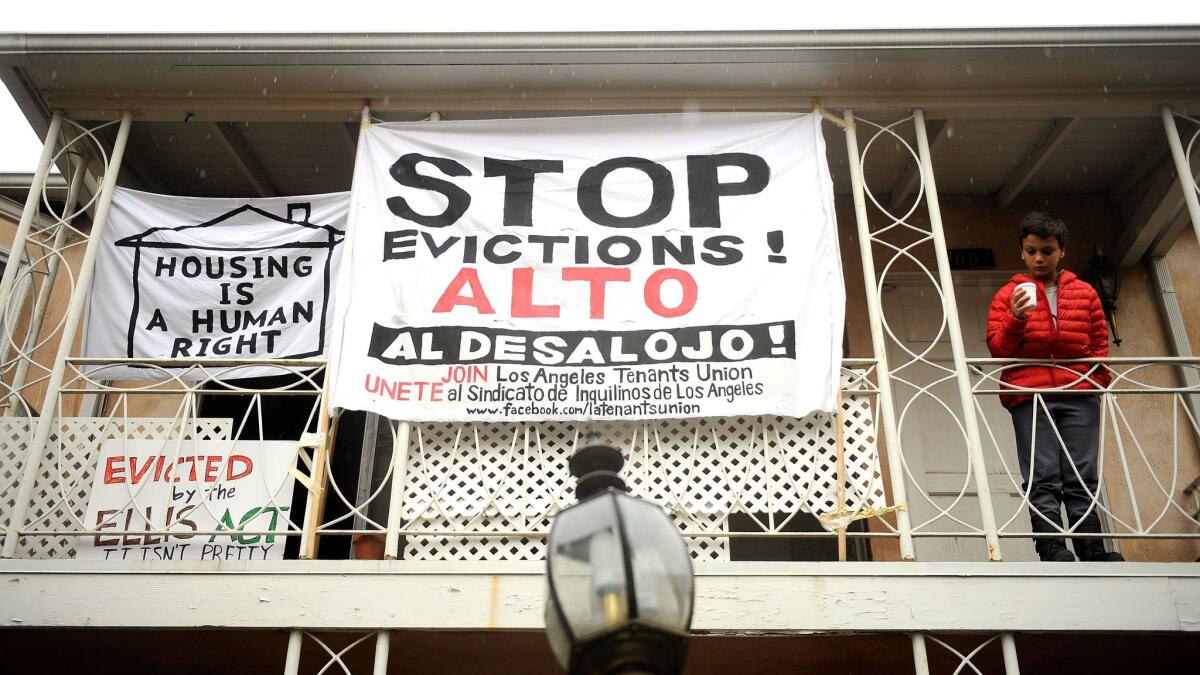L.A. stiffens rules for replacing rent-controlled units

- Share via
Los Angeles lawmakers voted Wednesday to stiffen city rules surrounding the demolition of rent-controlled apartments, aiming to ensure that more affordable housing is built.
But business groups have challenged whether the plan is fair — and whether it will stand up in court.
Under a California law called the Ellis Act, landlords can eject tenants from rent-controlled apartments if they are tearing down a building or getting out of the rental business.
In Los Angeles, if landlords tear down rent-controlled units and replace them with new rentals within five years, all of those new units fall under city rules that limit rent increases. There’s also an alternative for landlords who want to avoid putting an entire building under rent control: They must designate some of the new units as affordable housing.
Under that exemption, building owners have had to replace all of the rent-controlled units that were eliminated with affordable units or ensure that 20% of the new units are affordable — whichever number was lower.
Now, L.A. will require those landlords to provide whichever number is higher, a requirement that could end up being much stiffer.
Anna Ortega, who oversees rent stabilization programs for the city housing department, said the proposed change was meant to prevent the city from losing affordable units.
“It really depends on the math, but 20% could be fewer than the number that were demolished,” Ortega said.
The change was backed by tenant rights groups who lament that the Ellis Act has had a devastating effect on rent-controlled housing: Between 2001 and 2016, almost 22,000 rental units were eliminated in Los Angeles under the law — about 3% of the rent-controlled housing stock, Ortega told city lawmakers earlier this month.
“This has reached epidemic proportions, creating chaos in our communities and directly exacerbating the homeless problem,” Silver Lake resident Carol Cetrone said.
Business groups, however, said they were concerned that the new requirements could be onerous for big projects.
Land use attorney Karen Hallock, a member of the Central City Assn., said that the new rules could end up requiring landlords to provide far more affordable apartments than the number of rent-controlled units they tore down, particularly if they are replacing small buildings with big ones.
For instance, Hallock wrote that under the new rules, if a landlord demolished a building with six apartments that were covered by rent-stabilization rules, then replaced it with 300 new units, he or she would have to provide 60 units of affordable housing — or make the entire building rent-controlled.
At a recent meeting at City Hall, Hallock and another attorney challenged whether the rules were legal, invoking a case that landlords successfully brought against Ellis Act-related requirements recently in San Francisco.
“It’s a big shift in policy, and it’s going to kill housing production,” land use attorney Noel Hyun said.
Larry Gross, executive director of the Coalition for Economic Survival, called those “idle threats” and said he was heartened that lawmakers did not back away from the idea. In the past, he said, the looser rules had resulted in a net loss of affordable or rent-controlled units.
Gross rejected the idea that the new affordable housing requirements were excessively strict. “The fact is, they’re getting a break,” Gross said. “They’re being allowed to rent again within five years.”
The new ordinance also tightens some other rules surrounding city enforcement of the Ellis Act. For instance, it clarifies that vacant units also are covered by the city requirements, a provision added to ensure that landlords do not try to evade the rules after pressuring tenants to leave their apartments.
Tenant groups argue, however, that the city must do much more to beef up enforcement when landlords flout the rules. City lawmakers, in turn, say the fight must go to the state level.
The Ellis Act had an arguable purpose when it was first passed, but “now it’s just a tool for developers to buy properties, assert that they aren’t making money on them and flip them,” Councilman Paul Koretz said.
The council unanimously passed the new law Wednesday 12 to 0 with no discussion, with council members Joe Buscaino and Jose Huizar absent.
Twitter: @LATimesEmily
More to Read
Sign up for Essential California
The most important California stories and recommendations in your inbox every morning.
You may occasionally receive promotional content from the Los Angeles Times.











